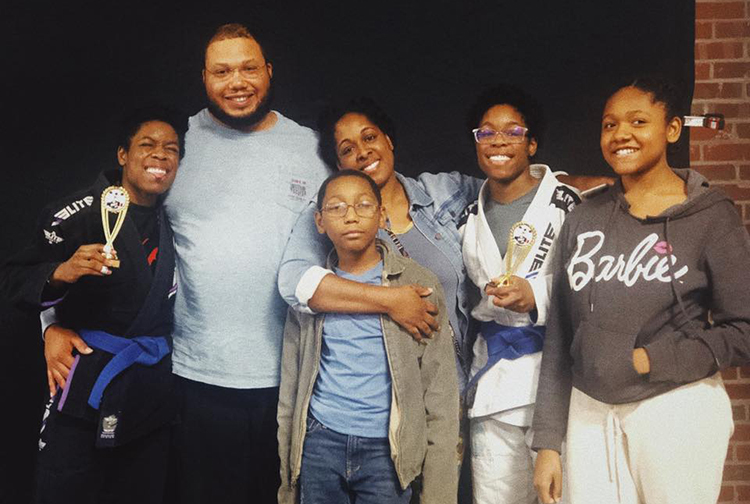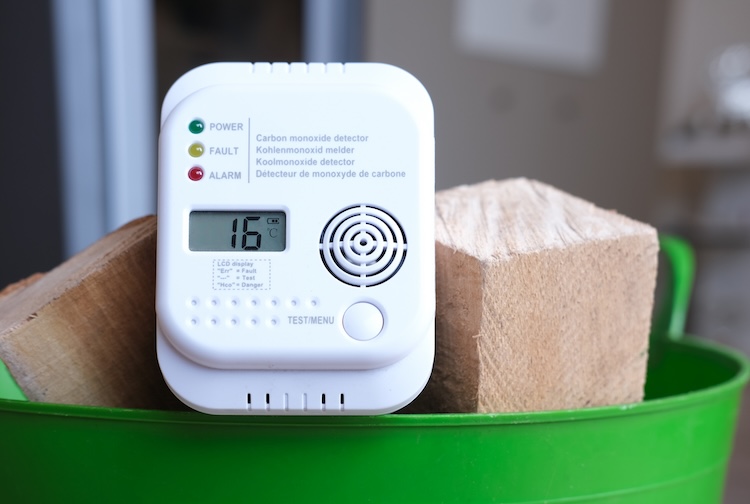
The road to recovery from COVID-19
Thanks to his wife, kids and care teams at VCU Medical Center, Johnnie Harris is back on his feet.
November 11, 2020 Johnnie Harris (second from left) and his family. (Photo courtesy of Johnnie Harris)
Johnnie Harris (second from left) and his family. (Photo courtesy of Johnnie Harris)
By Mary Kate Brogan
The journey to a full recovery starts with a first step. But for Johnnie Harris, that first step was daunting.
After surviving COVID-19, double pneumonia and multiple organ failure, Johnnie wasn’t sure whether he could handle getting out of his hospital bed to walk across the room. After the toll the disease took on his body, the 42-year-old husband and father of four had to learn to walk, talk, eat and shower again.
“Before COVID, of course I did everything on my own, and I was pretty much a healthy guy for the most part,” Johnnie said. “But after COVID took over my body, it’s almost like I do need that extra assistance. And I’m thankful for my immediate family — my wife and all four of our kids — to help me get through it so far.”
The battle with COVID-19 that started with a headache and fever still isn’t over. But with his family and a hard-working health care team at his side, Johnnie has made plenty of strides since he first arrived at VCU Medical Center in March.
‘He was really sick’
In March, Johnnie Harris had a headache, fatigue and a fever that wouldn’t break. Then came shortness of breath. After consulting his doctor and visiting a nearby clinic, Johnnie was sent home. When his condition worsened, his wife Onyshia — herself a nurse — took Johnnie to VCU Medical Center.
There, Johnnie was diagnosed with COVID-19 and double-pneumonia. The 42-year-old Midlothian resident had no pre-existing conditions.
When he was admitted to the intensive care unit (ICU), Johnnie was struggling to breathe, and his lungs and kidneys began to fail. Within 72 hours, Johnnie was placed on a ventilator and put in a medically-induced coma, where he remained for 18 days.
“He was really sick,” said Dr. Catherine Grossman, an attending physician in the Division of Pulmonary Disease and Critical Care Medicine, who took care of Johnnie in his early days. “He had multiorgan failure, was on continuous renal replacement therapy and was on medication to help raise his blood pressure.”
Grossman said that while on dialysis to save his failing kidneys, Johnnie began micro-clotting, a symptom of COVID-19 that became more well-known as the pandemic wore on but was relatively unknown in the early days.
Onyshia Harris spoke to nursing and medical team members in the ICU daily to get updates. “We were doing our best to keep his family in the loop because no one could visit,” Grossman said.
“We’d be chatting, and they’d be like, ‘Oh, we were just on this conference call with doctors across the globe,’” Onyshia said. “The fact that they were able to get the information — to know that doctors worldwide were starting to see the micro-clotting — they saw it [with my husband] immediately. They started treating it. All of that together just plays into how well VCU works with a multidisciplinary team to get someone back home like they did. It’s a perfect model.
“Because VCU is a research hospital, they were all so very open. All the options that were available were placed on the table.”
Day-to-day in the ICU
With Johnnie still in a coma, nurses tried to add a degree of normalcy into his life by playing HGTV’s “House Hunters,” a TV show he and his wife enjoyed. Onyshia watched at home and listened on the phone, as if Johnnie were watching with her. The nurses also played songs by Johnnie’s favorite artist, Rick Ross. “I just thought it was so sweet that they were willing to do whatever they needed to do to keep him peaceful in that moment,”Onyshia said.
Onyshia herself was battling COVID-19 and was self-quarantining at home. “Of course I could not talk to him [because of the coma], but I felt like I was, and I hope and pray that he heard me. Apparently, he heard something, and the good Lord heard our prayers.”
At one point, doctors had trouble getting a neurological response from Johnnie and were considering additional procedures to help him breathe. But soon after, Johnnie awoke from his coma. His nurse set up a FaceTime for the couple, though Johnnie was still on his ventilator.
It was at that moment that Onyshia and Johnnie’s nurses noticed something astounding. Johnnie began moving his hand on his own. Soon after, he picked up and dropped his arm as the nurses cheered his success. It was just a little movement, but it was movement nonetheless.
“And [on the call] I’m like, ‘I love you.’ And I’m trying to hold my tears in,” Onyshia said. “And even with the [ventilator] tube in, he goes, ‘I love you too.’ And at that moment, I did everything [I could] to not cry.”
The next day, Johnnie was taken off the ventilator. A few days later, he left the ICU for a less critical setting.
The first step
Physical therapist Andrew Thorpe helped Johnnie regain the strength to stand and walk again. “Though he was in a coma for some time, he was actually able to stand on our first visit, which was amazing!” Thorpe said. “I knew then he was going to get better.”
It generally takes awhile for people recovering from COVID-19 to go from standing to walking. “COVID-19 affects the lungs such that people need a lot of rest breaks,” Thorpe said. “Overall, people who are heavily sedated, immobilized and on bedrest will lose their strength extremely fast.”
For every day a person is in bed, it takes one to three days to get back to their prior level, Thorpe noted. “With COVID-19, I imagine it’s higher because of the damage the virus has on the lungs and the inability to ‘push’ the patient. Recovery is slower.”
When Jaclyn Nester, a clinical nurse in the Comprehensive Medicine Unit at VCU Medical Center, told Johnnie she would get him up and walking, Johnnie was hesitant.
“She got my walker, got me standing up, and I took two steps and was like, ‘Wow,’ ” Johnnie said. “I really appreciated her for her persistence because honestly, I did not want to try after failing [to walk] the previous Friday. I just didn’t want to try again. But I thank her for that.”
Nester said the moment Johnnie first got up and walked was emotional for both of them.
Johnnie’s nursing team learned a lot about the Harris family by talking with and video-calling them. They could see how important it was for his wife and kids, and for Johnnie, to get home to his family. A thank-you note from the Harris family still hangs on the nursing staff bulletin board.
Besides regaining his ability to stand and walk, Johnnie needed to relearn how to eat solid food and manage getting to and from the bathroom.
“It is a learning process, and he was meeting those milestones,” Nester said. “And honestly, I thought he was meeting them more quickly than I would have imagined.”
After four weeks in the hospital, Johnnie was healthy enough to go home. His journey back to normal didn’t stop there, though. It has continued for months as Johnnie regains strength and returns to normal.
“The doctors in the ICU always said, ‘You’ve been through a lot. You are a true survivor,’” Johnnie said. “My state was pretty rough from what I hear.”
When Johnnie came to the hospital in March, the preventive measures for COVID-19 weren’t as well-known as they are today. Dr. Bennett Lee, who served as Johnnie’s physician during his recovery on the Comprehensive Medicine Unit, said Johnnie’s case serves as a reminder why it’s so important for people today to “remain vigilant, wear your mask, wash your hands and socially distance.”
“I think a lot of people get lulled into that sense of complacency, and it’s human nature,” said Lee, an associate professor in the Department of Internal Medicine. “I talk to my colleagues about this all the time where we hear patients who are telling us, ‘Oh, well, it’s getting better,’ or ‘It’s not as serious as people say.’ And we’re like, ‘No, that’s not true. It is still very serious.’ You can't know if you’re the person who’s going to have mild symptoms or be like Mr. Harris [with no past medical issues] and get really, really sick.”
The journey continues
Before Johnnie returned home, the couple’s 19-year-old twins mowed the lawn — a task typically reserved for Johnnie. No one else in the family had ever cut the grass — just Johnnie.
“They’re like, ‘We’re not going to have him come home and see this grass looking like this!’” Onyshia recalled, with a laugh. “But you can see him, all surprised, going, ‘They touched my lawnmower?’”
Johnnie’s condition continues to improve. The twins are helping him regain muscle mass with resistance bands, and he takes frequent walks. He knows not to push himself too hard, though.
“Coming home, there was some weakness walking,” Johnnie said. “I would take 10 steps and sit down. That was just common because of the post-COVID situation. But I was determined to walk.”
Within two months, Johnnie was mowing the lawn again — though just the front yard. He took a breather. The back yard could wait.
“I still know I have a long ways to go before I even get close to where I was before, but I’m thankful [for] where I’ve come from, what I’ve been through,” Johnnie said. “And I’m glad that I’m able to be here to tell this story and to be with my family.”
Visit vcuhealth.org/covid-19 for more stories about COVID-19 survivors and what we’re doing to keep patients safe.


